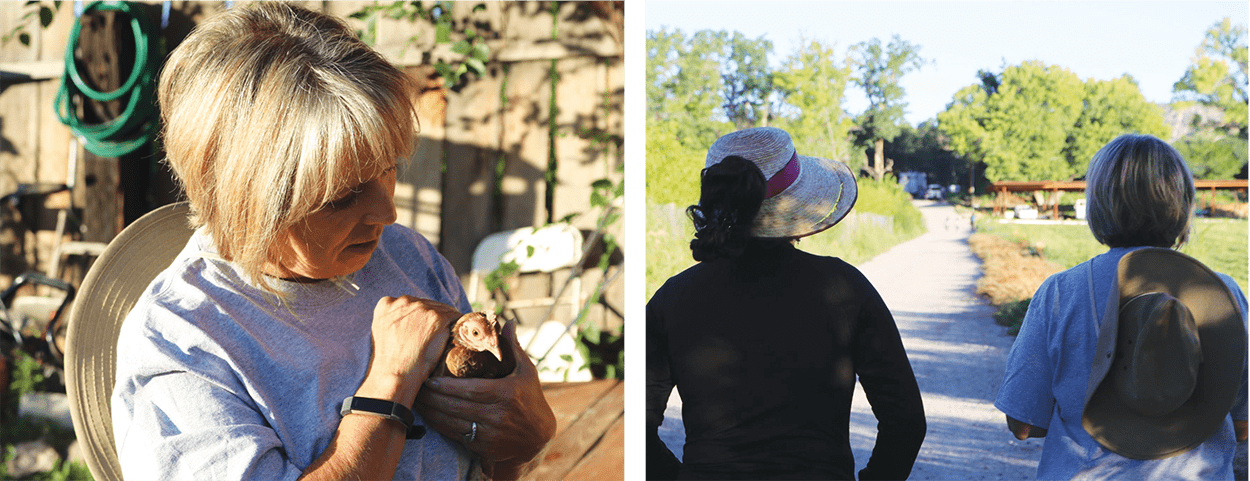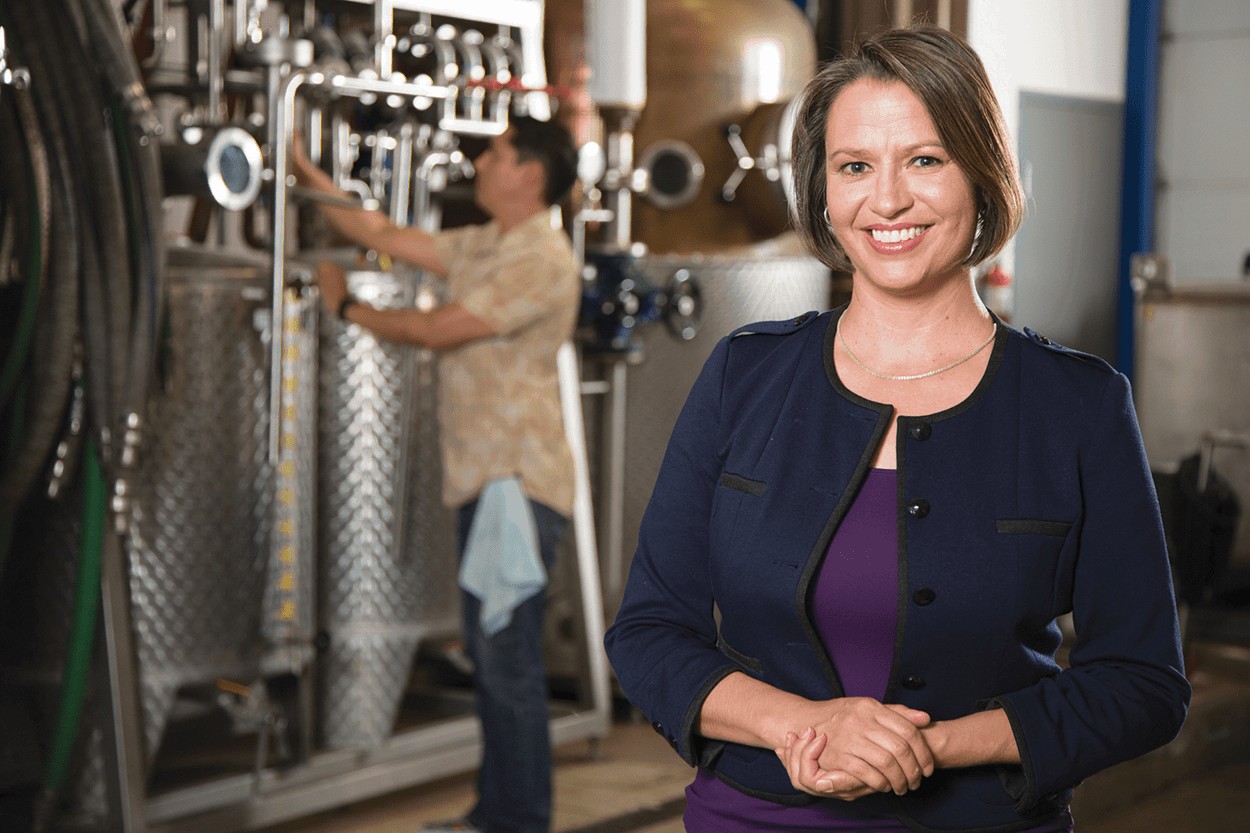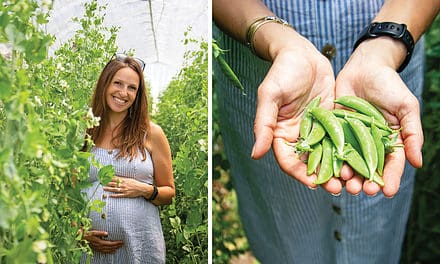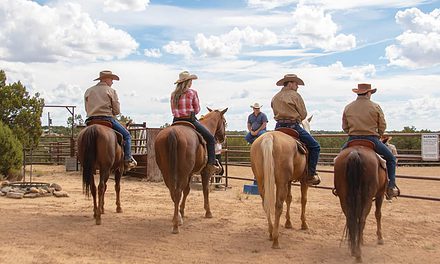A Conversation with Candidates about Food in New Mexico
Interviews and Introductions by Willy Carleton

Gubernatorial candidate Michelle Lujan Grisham bunching carrots at a farm in New Mexico. Photo courtesy of Michelle Lujan Grisham campaign.
With the November elections on the near horizon, edible reached out to candidates in several races to ask how they would shape the foodscape of our state. We begin with a conversation with Michelle Lujan Grisham, a Representative in the US House and the Democratic candidate for governor. Lujan Grisham sat down with me at Verde in Santa Fe. Her Republican opponent in the New Mexico gubernatorial race, Representative Steve Pearce, did not respond to edible’s requests for an interview.
edible: How would you, as governor, prioritize New Mexicans’ access to sustainable and locally grown food?
MLG: I’d make sure that we get fresh produce and fresh foods that are locally grown into schools and other public programs, such as subsidized child-care and senior programs. Because of issues surrounding storage, distribution, and pretty draconian requirements that are well-intentioned but onerous, we don’t really incentivize locally grown, high-quality food. You can change those policies at the state level by creating incentives. We have to invest in food storage infrastructure, which makes a big difference in keeping the supply chain moving.
Another way is to look at food assistance. There’s a Double Up Food Bucks program embedded in the most recent authorization of the funding of the Farm Bill so you get double the amount of money. So basically, [normally under the Supplemental Nutrition Assistance Program (SNAP)] it’s a buck fifty per amount of meal, which is awful. The Double Up Food Bucks program means that I’ll give you three dollars, roughly, if you buy fresh fruits and vegetables. And where we like you to do that is at participating grocery stores and at farmers markets, because we want [SNAP recipients] to have a relationship with the people growing that food. It changes their eating habits, it changes their awareness, and it puts money into the hands of local farmers in a much more direct fashion.
Money from the USDA can make a real difference in expanding a farmer’s produce and agricultural footprint, giving that farmer the resources to invest in either buying or leasing land. So there are a variety of programs tied to SNAP both directly and indirectly, and if the federal government continues to be draconian about moving away from [food assistance], those are places where states will have to make it up until we get Congress not to lose its mind.
edible: What do you see as the biggest threat to New Mexican agriculture right now?
MLG: There are a bunch, but water is among the most difficult and challenging, and also access to land. It’s too expensive, so we can’t grow in the way that we would like to. Now, I am not a Pollyanna about water here, but I’m not nearly as pessimistic as most folks on the campaign trail. However, I’m concerned about this lawsuit with Texas and other state stakeholders, where Texas claims that we owe them probably a billion dollars in water.
We, in my opinion, made a huge mistake engaging in a litigious manner. I would argue that we don’t have seasoned water lawyers on this case from the AG’s office; that the state engineer is not a seasoned, well-regarded water expert; that the interstate stream commission of folks on all of these water foundations all work in a vacuum and don’t work very well together—that was all by design by this governor—and they don’t have the capacity to do water management, water technology innovation, and water conservation, and we must immediately do all of those.
I want to do a fifty-year water plan. Water is not a one to two-year planning process, and that means what we need, in terms of water technologies, is really knowing what the quality of our water is and where it is, because we really don’t have state-of-the-art reviews. We’ve been mapping better, but we really need to make sure that we know that we can meet our agricultural needs for a hundred years. Drought is the new norm, so we better figure that out—and I think we can. I think we can grow the same kind of quality products with less water and do it in a much more effective way.
Finally, as one of my economics segments I want to promote value-added agriculture, which includes looking at incentives for water innovations and technologies, and I want to support a center of excellence toward that goal. I’ve identified the land grant university [as that center], because that’s where we’ve made those investments already. Let’s make sure that those investments are working.
edible: Speaking of water, where do you stand on fracking in New Mexico?
MLG: It’s a contentious issue, and the truth is that an all-out ban on fracking is the easiest way to deal with that, but it is not a practical way. I don’t even think that if you wanted that that you could win it if somebody were litigating it. And we’re the third largest oil and gas producer. So, with regard to fracking, we want no more methane plumes, we want to do methane mitigation, and we need to talk about the water that we’re using in oil and gas. It’s a completely unfair investment when we don’t have enough food security and we have all these food deserts, but we’re using water we don’t readily have in [the oil and gas] industry. We want to make sure that fracking industries are held accountable for water problems, including water pollution, and we need to be much tougher on those environmental standards. And the best way out of fracking is renewable energy.
I want to move immediately into renewable energy. It’s a reasonable investment in that infrastructure and you have to stay the course, like long-term water planning. You get your transmission lines in, you take advantage of those tax credits, you join all the regional transmission authorities, and you invest in the infrastructure with these businesses that want to do wind and solar energy. As governor, I’ve got to give businesses investing in wind and solar energy the tools that they need to make sure that that’s an expanding business.

Photos courtesy of Michelle Lujan Grisham campaign.
edible: In our last issue of edible, we looked at some of the challenges and dangers women food workers and farmworkers face. How would you support equity in the workplace?
MLG: In every vehicle and measure possible. If we want to stamp out discrimination, we need to lead by example and make that clear. If you want a government contract, you want our investments, we will hold you accountable. Discrimination is very real, both based on gender and on racial and ethnic backgrounds. So, minority ranchers and farmers have engaged in huge lawsuits, and now there are settlements out of the USDA with black farmers and Native American farmers. Hispanic farmers have won their settlement, but we’ve been very slow to make those awards and to sufficiently identify that we’re meeting the needs of all those farmers that were discriminated against. Those ranchers couldn’t get grazing permits, they didn’t get USDA investments, they wouldn’t let them participate in any of the educational efforts—they were just blocked out. So those lawsuits tell you that those are real issues. And they are exacerbated by gender. It’s largely a male-dominated field, and it’s the same thing that you see everywhere. So lead by example: if you want a government contract, I want to see what your policies are, I want to see how many women-owned farms and ranches and food associations or cooperatives or grocery stores or whatever part of that distribution effort you’re in. I want to see how that’s working.
The second thing that you can do is make sure that you get into the educational system early and you recruit girls. It’s exactly what we’ve done in robotics, engineering, how you got to STEM and STEAM. Historically, it is not only that we weren’t graduating enough young people, but we were terrible at making sure the girls were part of that design. We need to require that [our] education system has absolute gender equality. That will change the dynamic in the future.
edible: Is there anything that you would do in particular to support the growth of local food industries and value-added producers, such as restaurants and breweries?
MLG: We need to brand who we are in terms of our food. You know, historically, we used to help both small farmers and food producers market their products so that they would get both in-state availability and out-of-state marketing for their products. New Mexico does a really poor job of that. The state could do a much better job. We have to help with that marketing, help with that branding. We have to make sure that we’re talking to those purchasers. I talked about how I want local food in school and senior programs. Well, if you embed that in your own purchasing activities, it creates a really unique market for getting it purchased everywhere else. So, we will want to work with federal grants and we will work with local farmers and ranchers to figure out how we want to brand and market those products, and get them from farm to table, whether it’s locally or it’s being exported out.
And look what we’re doing with craft beers. We have to think about a way to tell our story of success. We are winning lots of awards. People weren’t paying attention, so we want to make them pay attention…. And the state has a role. That has to be a part of our economic design.
edible: How do you feel about the possibility of growing hemp in New Mexico?
MLG: I love it. Please write a really thorough, thoughtful, positive article in your magazine that shows what we’re missing by not fully engaging in hemp production in this state.
edible: So, needless to say, if you’re governor, hemp production will happen?
MLG: It’s done. First of all, I’ve got a proactive policy about cannabis in general. But, as your readers know, its rope, not dope, and it can be used for so many things—they’re even building houses with it. So far, there aren’t too many things it can’t be used for—maybe NASA still has to figure out a way that they want to use it in space? But, no, it’s amazing. And we don’t know enough about it because we haven’t grown enough. We’ve really been myopic.
I brought medical cannabis to the state—I tried to do it in the Johnson administration but didn’t succeed until Richardson—and as the debate has unfolded about recreational cannabis, I have no doubt that we can meet the challenges it represents. And there are challenges—surrounding intoxication, prevention, underage use, edibles, worker environments, and public safety—but we are smart enough to figure it out, I have no doubt. And then we have the ability and opportunity to learn from the mistakes—and there have been some doozies, including in Colorado—from all the other states. Perfect! This may be one of those things where not jumping in too early provides the opportunity to learn. So I’m interested in an industry that’s both productive for us economically, productive for the state in research capacities, and productive in the way that we model education. So I’m all in. I want the legislature to put them together and I don’t want them to drag their feet. Do it together, do it up front.

State Representative and land commissioner candidate Stephanie Garcia Richard. Photo courtesy of Stephanie Garcia Richard campaign.
Although the gubernatorial and congressional races more often get the headlines, the under-recognized New Mexico land commissioner race has potentially significant and far-reaching ramifications for the local food economy and the state’s greater environment. I met with Democratic member of the New Mexico House of Representatives and candidate for land commissioner Stephanie Garcia Richard at her Santa Fe office in late June. Her opponents, Patrick Lyons and Michael Lucero, did not respond to edible’s requests for interviews.
edible: In terms of sustainable agriculture, regenerative ranching, and the development of a thriving local food economy, what’s at stake in the upcoming land commissioner race?
SGR: Good land management is essential to good food, and I see two specific ways this race can impact local food systems. Number one, the office has a lot of leverage in terms of the land that it leases to ranchers and other developers for different types of land use. I think that we need to look to the office to provide leadership around both encouraging and incentivizing sustainable water use and rotation of crops and cattle on state trust land, looking to the future and the long-term sustainability of those lands. Number two, the land office oversees and manages nine million acres of land, so it that’s a large area. It’s not all contiguous, it’s broken up by section, but there’s a lot [and] there’s an opportunity to partner with agencies and groups like the Natural Resources Conservation Service, the US Forest Service, or the sustainable rangeland program at New Mexico State University (called Jornada), all to do broad-scale landscape management. That all plays into what’s at stake with the health of the land, and the water most importantly.
edible: How could you incentivize more sustainable practices?
SGR: We could do it through the lease agreements. For example, we could give you a refund or a reduction in cost from your lease if you agree to particular conservation practices. We can also reinstate millions in renewable energy projects abandoned these last four years and ensure we use state land parcels to establish renewable energy transmission lines and become the leader in sustainable food and energy practices.
edible: You mentioned water. How would you protect New Mexico’s water resources?
SGR: So there are a number of ways that our land office plays a role in our state’s water. Of course, all water rights and all of that kind of jurisdiction is with the Office of the State Engineer. But for the water rights tied to state trust land, not allowing any more large-scale use of fresh water in our most fragile aquifers, like the Ogallala, is a perfect example. There’s a lot that the office can determine just through lease agreements: There is determining whether or not new proposed leases are even going to be approved [based on] if they are going to use large amounts of our fresh water; there is incentivizing recycling of water and using produced water; there is co-locating any activities that require water next to produced and recycled water facilities. So that’s one whole area of advocacy where the office has a direct impact on water use by approving or disapproving leases.
But then there are other things: incentivization, and I have already talked about that, but also just prioritizing watershed health. We can create “wet water” by eliminating invasive species, by sustainable long-term landscape practices that draw water down and capture it in the soil. They call it creating wet water.
The third thing that the land office can do is really advocate around the protection of our water rights in any water law changes that are proposed. Fighting out-of-basin transfers will be important. There’s a lot being proposed right now; you may have heard of the proposed transfer of a number of acre-feet out of the San Agustin Plains for municipal use, rather than for agricultural use. That threatens ecosystems, that threatens local food supply and local food economies. And then it’s about ensuring that we are protecting the water that people have used for agriculture for hundreds and even thousands of years.
edible: What is your stance on fracking? How, as the land commissioner, would you affect fracking in New Mexico?
SGR: I think that the land office really is the pivotal point in the direction fracking goes in this state. So now, as we’re facing the climate realities that pose serious health concerns, environmental concerns, even economic concerns, the land office really needs to begin by banning fracking in fragile aquifers; by really pushing the industry to not use fresh water; and then by providing a just transition away from the heavy reliance on extractive industries to a more sustainable, renewable energy generation model.
edible: What is your stance on the US-Mexico border wall, and how could the land commissioner affect the building of a wall?
SGR: I think the border wall is un-American. I think that it divides families and cultures. It is an insane waste of resources. But we have leverage on the building of the border wall because we have twenty-two miles of state trust land in the bootheel that the office has complete purview over. Eminent domain would have to be called upon that land, or the commissioner taken to court, or National Guard troops would have to be stationed there, but the bottom line remains that the twenty-two miles of state land that we have on the southern part of our border are at the complete preview of this office. Not the governor, not the legislature. So I believe that gives this office leverage, using its high profile and its bully pulpit to really stand up and push back and speak out against the building of that wall.
edible: And you’ll use that leverage?
SGR: Absolutely.
edible: What are the biggest threats to New Mexico’s public lands and how would you address them?
SGR: The biggest threat is always water. . . . The second biggest threat, truly, is the grab from the Feds. We see the shrinking of some of our protected monuments nationwide, and that could happen here to New Mexico. So I believe that, where we have state trust land bordering monuments within national monument borders, [we need] to stand up and resist those threats to protected lands. I think a strong land commissioner can provide a real model for land use nationwide, and certainly in the West, for how a land commissioner cares for our state land, for how a land commissioner stands up to land grabs, for how a land commissioner uses the large voice of the office to advocate for protection of public lands.
I’d also like to mention that, when this office was first created, it was created with a lot of autonomy and not a lot of oversight. So there’s no check and balance, really, on the office. The governor has the check and balance of the legislature and vice-versa, but not so with the land office. So you cannot do anything that I talked about without bringing some transparency and accountability to decision-making into the office, and that’s always something I try to remember to emphasize. That’s something I want to champion and something I want to change formally through legislative work. Right now, land deals are made behind closed doors, in the dark, and there are very minimal public notice requirements. So, more accountability and transparency, and really bringing the office to light, all has to happen before any of the solutions that I mentioned really take hold because we’re trying to create a culture in the office that will continue with whoever is land commissioner.

Deb Haaland, Democratic candidate for US House of Representatives, First District. Photo courtesy of Deb Haaland campaign.
In addition to requesting interviews from each of the gubernatorial and land commissioner candidates, edible reached out to several candidates in our congressional races with simply one question: If elected, how will you prioritize increasing New Mexicans’ access to sustainable, locally grown food?
Deb Haaland (Democratic candidate for US House of Representatives, First District): If elected to Congress, I will fight for our local farmers and prioritize access to sustainable, locally grown food at every turn. My father’s parents were farmers who immigrated to the US, and as an enrolled member of the Pueblo of Laguna, I know that we would all be better served by getting back to the land and locally grown food, and turning away from our reliance on large factory farms. In Congress, I will play an active role in the [Federal] Farm Bill that is likely to be an ongoing conversation into 2019. We need a Farm Bill that supports a healthy, sustainable, humane, and beneficial fair food system for everyone—no longer should it foster pesticide-intensive agriculture and prop up factory farms. The current Farm Bill places almost all subsidies directly or indirectly into meat, dairy, and high-fructose corn syrup, at the expense of the less than one percent that goes to fruits and vegetables. No longer can the Farm Bill be a handout to the mega factory farms. The Farm Bill should provide for substantial investments into the development of plant-based and clean meat technology, which will not only require less land and resources, but also decrease the risk of global public health threats. As a single mom, I struggled to get access to healthy food for my daughter while on food stamps. We need to ensure [that] New Mexicans of all income levels, including people on SNAP, have access to the fruits and vegetables they need to stay healthy and strong. That means innovative solutions like ensuring people can use SNAP at farmers markets, and simple solutions like ensuring local fruit and vegetable farmers aren’t losing out on subsidies that factory sugar farmers get.

Martin Heinrich, Incumbent Democratic candidate for US Senate. Photo courtesy of Martin Heinrich campaign.
Martin Heinrich (Incumbent Democratic candidate for US Senate): Like parents across New Mexico, knowing what’s in the food I buy for my family—and where it comes from—is important to me. Increasing access to sustainable, locally grown food creates a safer, healthier, and less environmentally impactful food supply, while supporting New Mexico farmers and growers. That’s why I was proud to successfully boost funding for initiatives like increasing access to locally produced foods for low-income families and promoting SNAP benefit use at farmers markets, and why I have fought to provide fresh, locally grown food to those who receive WIC benefits. That’s also why I continue to fight for clear and accurate labeling of food products, including GMOs—so we can all make more informed decisions about the foods we are feeding our families.
Increasing access to sustainable, locally grown food doesn’t just benefit our families, it also boosts New Mexico’s dynamic agriculture economy. That’s why I’ve supported legislation to increase federal funds for specialty crops like green chile, to strengthen the crop insurance program, to provide relief to our producers who are struggling from drought conditions, and create grants to help ensure the next generation of farmers can succeed. New Mexicans can count on me to do all I can to continue to champion efforts that support our families’ health and well-being.
Note: edible reached out to congressional candidates of both major parties with this question, no other candidates replied in time for publication.
Willy Carleton is a historian, writer, and educator, helping aspiring gardeners and farmers hone their skills and deepen their connection to the land through the School of the Desert Garden. He is a former editor of edible New Mexico and is the author of "Fruit, Fiber, and Fire: A History of Modern Agriculture in New Mexico." You can follow his current ruminations on growing food in the drylands at desertgarden.substack.com.


















